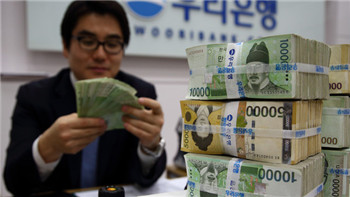
Still worried about China? Sell South Korea. The won is the latest member of the growing group of proxies for negative views on the Asian giant. Other trades have included selling the Australian dollar, dumping miners worldwide and shorting Hong Kong-listed Chinese names — not to mention betting directly on a weaker renminbi.
还担心中国么?赶快抛售韩元吧。看跌亚洲巨人的代用工具越来越多,韩元是最新一个。此前其他交易包括抛售澳元、抛售全球的矿商股,以及做空在香港上市的中国内地企业——且不提直接押注人民币走软。
The won has lost 5 per cent against the dollar this year, making it the worst performer after sterling and the Mexican and Argentine pesos. It now sits at four-year lows, at Won1,234 to the dollar. Reasons for its weakness include 2016 portfolio outflows from Seoul, which are more pronounced than among regional rivals, with a net $2.7bn having fled by the end of last week, according to JPMorgan. The next worst outflows have been from India, which has lost $2.4bn. The rupee, down 3.5 per cent, is the worst performer in the region after the won.
今年韩元兑美元汇率已跌去5%,令它成为继英镑、墨西哥比索和阿根廷比索之后表现最差的货币。目前,韩元兑美元汇率处于1美元兑1234韩元的四年低点。韩元疲软的原因之一是2016年流出首尔的投资组合资金,这一资金外流趋势比亚洲其他对手更加严重。根据摩根大通(JPMorgan)的数据,截至上周末净流出资金规模已达27亿美元。规模仅次于韩国的外流发生在印度,它流失了24亿美元。卢比汇率已下跌3.5%,是亚洲除韩元外表现最差的货币。
Seoul’s soggy equities are driving outflows, as is a rush to hedge local derivatives tied to overseas assets. The bigger danger, however, comes from bond outflows, which have increased since the central bank this month signalled further interest rate cuts. Yields, particularly on longer-dated debt, have fallen as growth hopes have been revised lower.
首尔糟糕的股市正在推动资金外流,竞相对冲与境外资产捆绑的国内衍生品的行为也在产生这种效果。然而,更大的危险来自债券市场的资金外流,自韩国央行本月释放进一步降息的信号以来,这方面的外流规模已经加大。由于增长希望已被下调,韩国债券——尤其是较长期债券——的收益率已经下滑。
Behind all of this to some degree lurks China. As Korea’s biggest export market, any further slowdown there will be felt keenly by its neighbour. Even the hedging of structured products is linked to China: by far the biggest single group of derivatives are linked to Hong Kong’s Hang Seng China Enterprises index. Its weakness has driven the sellers of Korean derivatives to increase hedges, selling won in the process.
这一切的背后在某种程度上都隐藏着中国因素。作为韩国最大出口市场,中国进一步放缓的任何迹象都会被其邻国敏锐地感受到。在韩国,即使是对结构化产品的对冲也与中国有关:韩国遥遥领先的最大衍生品类别是与香港恒生中国企业指数(Hang Seng China Enterprises Index)挂钩的衍生品。该指数的疲弱已推动韩国衍生品的抛售者加大对冲,在此过程中抛售韩元。
Korea’s status as the sell-China bandwagon du jour has limits. Officials’ growing unease with the pace of the won’s move is a risk to shorting at these levels. The government has a history of intervention. It doesn’t want a strong won relative to its exporting rivals, but it will not tolerate a plunge. There is also a hefty current account surplus, running at almost 8 per cent of gross domestic product, for bears to reckon with. But if the path of other sell-China proxies holds, the bears will put up a fight. Hong Kong China-listed stocks offer record-low valuations and the Aussie hovers near five-year lows. Seoul should brace itself.
韩国作为抛售中国的代用工具也是有局限的。韩国官员对韩元下跌节奏日益不安,这对在当前水平做空韩元是一大风险。韩国政府有出手干预的历史。它不希望韩元相对其出口竞争对手的货币走强,却也不会容忍韩元的暴跌。此外,看空者还要考虑到,韩国的经常账户顺差很高,与国内生产总值(GDP)之比达到近8%。不过,如果抛售中国的其他代用工具仍然有用,看空者将会豪赌一场。香港中资股的估值处于创纪录低点,澳元也在近五年的低位徘徊。首尔应该做好准备迎接抛售。












